Have you ever considered allowing someone to live in a camper on your property? This unique arrangement can bring extra income, flexibility, and an overwhelming feeling of community. However, there are important legal considerations and possible difficulties to navigate, such as regulations regarding zoning, utilities management, and a type of responsibility. In this article, we’ll explore the benefits, challenges, and necessary steps to take if you’re interested in hosting travelers on your land.
Table of Contents
Benefits of Allowing campers or individuals to live on your Property in a camper
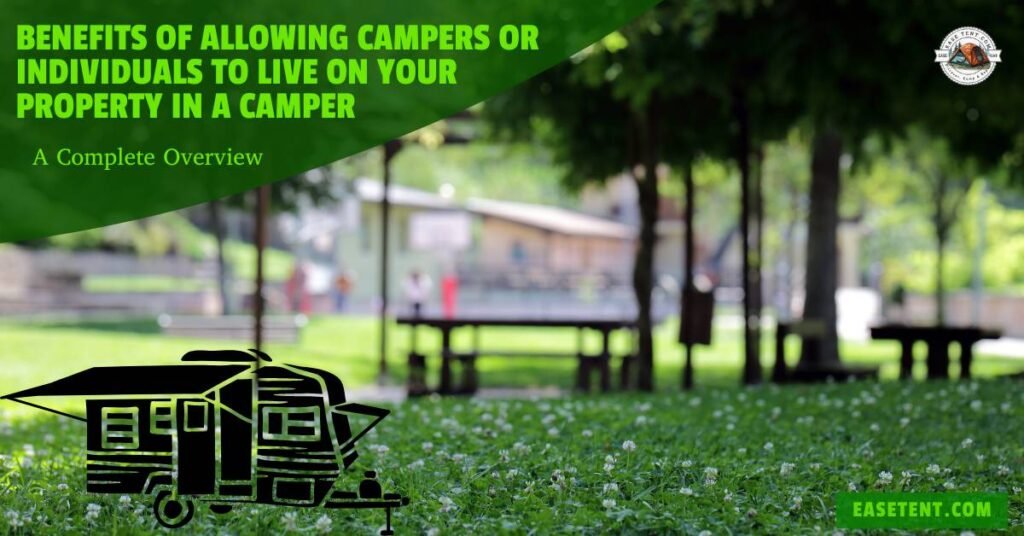
Allowing campers to stay on your property can bring multiple practical or personal advantages. Following is a detailed look at the reasons why you to think about this arrangement:
Additional Income:
Hosting the tourists may prove a profitable source of extra income, especially if you’re lucky enough to have free space on your property. This can help to reduce mortgage payments or cover property maintenance costs.
Flexibility and Minimalism:
Accepting the camping vehicle for living facilitates a minimalist way of life and flexibility for both you and your guests. It makes it possible for individuals to experience a different way of living without any demands of traditional housing.
Community Connection:
Community connection means the social bond and a feeling of belonging that can be created by permitting the campers to your property. By welcoming other people into your residence, you can develop the possibilities for interaction, shared experiences, and mutual support. This connection can lead to meaningful relationships, cross-cultural interactions, and an atmosphere of unity within your local community.
Environmental Benefits:
Embracing caravan residing can also provide environmental benefits by promoting a smaller ecological footprint as compared to standard housing. Most campers often utilize fewer resources like water and electricity, which leads to reduced energy consumption and waste generation. Furthermore, camper living favors a more minimalist lifestyle, which results in lower resource utilization and overall impact on the environment. By attending to the travelers on your property, you will not just promote environmentally friendly habits but also contribute to a healthier way of living.
Legal considerations
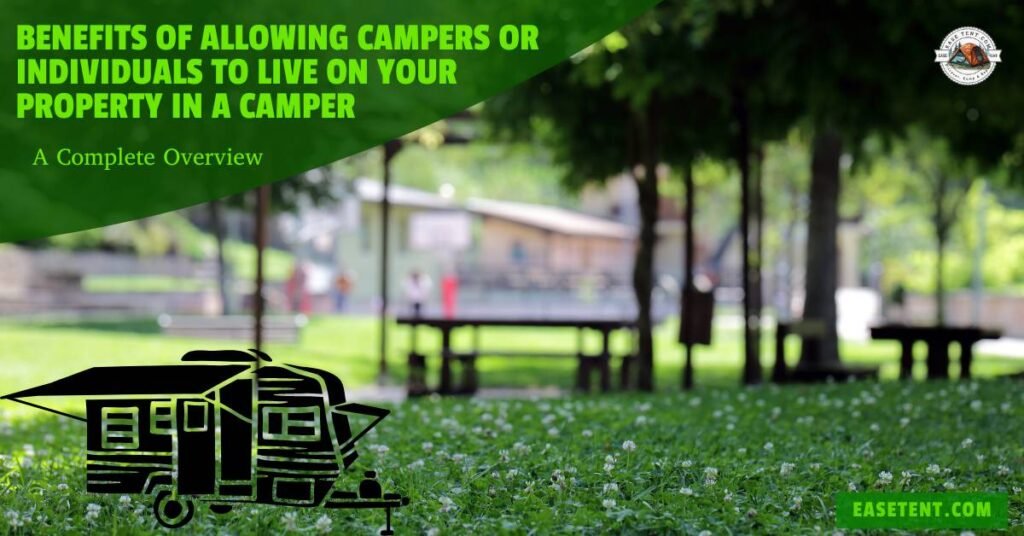
Understanding the legal requirements when permitting people on your land helps to ensure conformity and prevent any potential problems. Listed below is an in-depth look at key aspects:
Zoning Regulations
The zoning laws clarify how the land can be used in specific regions. Before hosting any tourist, you must verify your property’s zoning classification to confirm if temporary or long-term residence is permitted. Some areas might have restrictions on residential usage, especially for recreational vehicles or campers.
Building Codes:
Building codes are the standards established by local authorities that guarantee the safety and structural integrity of buildings. Even temporary structures like RVs could have certain building code requirements, like fire safety measures, electrical standards, and sanitary conditions provisions. Before dealing with any tourist, make sure that the camper on your property meets these codes to avoid legal issues.
Local Ordinances
Local ordinances are specific regulations implemented by municipal or county governments. Such regulations can cover a wide range of issues related to property use, including parking, noise levels, waste disposal, and occupancy limits. To ensure conformity when hosting the campers, familiarize yourself with important ordinances.
Navigating these legal considerations may require consulting with your local area authorities or legal professionals to completely comprehend the rules and restrictions that apply when managing campers on your land. By actively complying with zoning regulations, building codes, and local ordinances, you are able to establish a legally acceptable and safe atmosphere for camping. After practicing all these procedures, you will ensure a comfortable stay for both you as the property owner and your guests.
Duration of stay
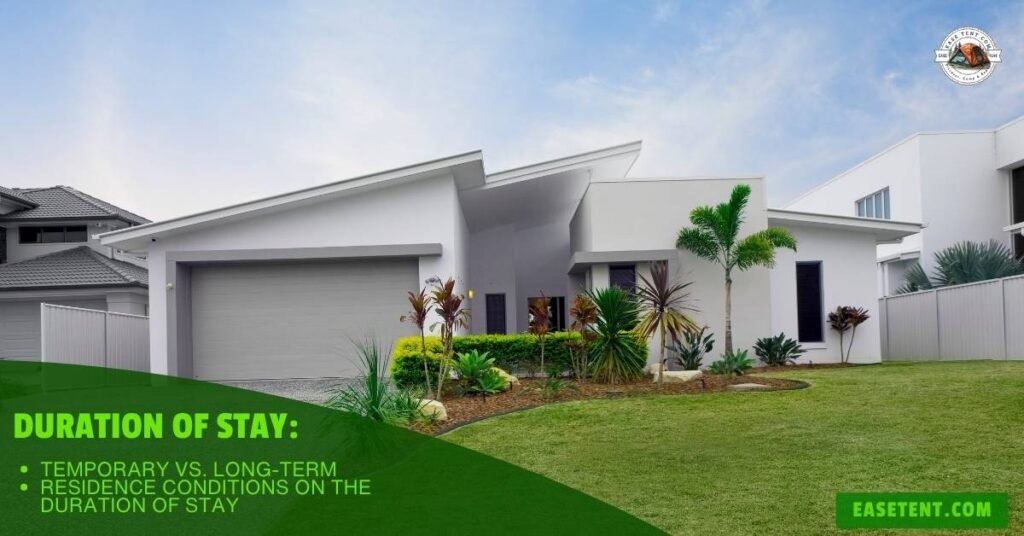
The duration of tourists’ stay on your land will likely significantly affect the nature of the arrangement and the legal implications. This is a detailed explanation of temporary versus long-term residence, along with the conditions that may apply:
Temporary vs. long-term residence:
| Temporary Residence: | Long-Term Residence: |
|---|---|
| Temporary residence is related to a short-term stay of someone on your real estate, cmainly for a specific duration that may range from a few days to a number of months. This sort of organization is preferred by vacationers, travelers, or individuals seeking short-term lodging. Short-term residents generally do not establish formal tenancy rights and may not require extensive legal documents. The duration of a short-term stay is decided upon in advance and usually has a clear end date. | Long-term residence means an extended stay on your site, similar to a traditional rental agreement. Such kind of agreement typically lasts over several months to years and they provide a greater stability and longer-term housing for occupants. Long-term residents can establish official tenancy rights and have been governed by local tenant laws and regulations. Hosts and renters typically enter into rental agreements that specify terms and conditions for the extended stay, including rent payments, responsibilities, and duration of occupancy. Long-term residence requires careful consideration of both legal and contractual commitments to guarantee a mutually beneficial and legally valid housing arrangement. |
Conditions on the Duration of Stay:
Conditions on the duration of stay indicate the specific terms and deals regarding how long a camper or any other is permitted to stay on your property. These constraints must be clarified in advance for mutual understanding and adherence. There’s a detailed explanation of it:
- Agreed Time-frame:
- The agreed timeframe is the time frame that an owner and a customer mutually decided upon for a camper’s stay on your property, including the start and end dates of occupancy.
- This timeframe clarifies how long the camper is permitted to stay on-site.
- For temporary stays, the duration varies from a few days to several months, while longer-term agreements may span from months or even years.
- Determining an exact timeframe creates goals and promotes successful interaction and conformity throughout the camper’s residency.
- Renewal Options:
- Renewal options mean the possibility of extending the duration of a camper’s stay in addition to the initial agreed period.
- This involves discussing and negotiating with the camper to determine if they wish to continue their residency after the original conclusion date.
- Renewal options usually involve reviewing the context, such as rental rates, the duration of the extension, and any new agreements or conditions.
- You must discuss renewal options in advance for proper scheduling and decision-making for both parties.
- Notice Period:
- A notice period is like the advance notification required by either party to terminate or modify a camper’s stay agreement.
- Usually, the real estate owner and the camper’s owner should adhere to a specific notice period, which could be stated in the rental agreement or lease terms.
- The notice period guarantees a smooth transition and allows sufficient time to make arrangements for the camper’s departure or any changes to the residency arrangement.
- Legal Implications:
- Understand the legal implications associated with different durations of stay, especially regarding the renter’s rights and responsibilities.
- Longer-term stays may require official lease documents and adherence to tenant laws.
- Flexibility and Communication:
- Maintain open communication with the renter about the duration of their stay.
- Be flexible to deal with changes or unexpected circumstances, while also respecting the agreed-upon conditions.
Setting clear and transparent conditions for the duration of stay helps to avoid misunderstandings and guarantees that both parties know their respective rights and responsibilities. Whether the deal is temporary or for a longer period, creating the aforementioned conditions helps provide a positive and legally sound hosting experience.
If you are planning a thrilling long-term camping, don’t forget to check my this article for an A to Z guide.
Utilities and waste management
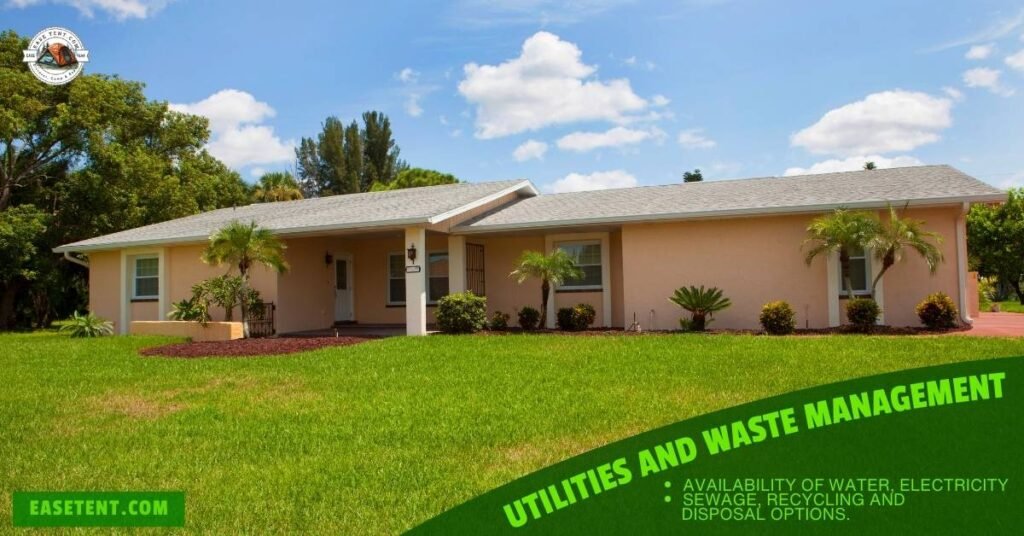
When you renting a ground or your backyard for camping you must consider services like utilities and waste management: Here’s a brief guide on it:
Availability of Water, Electricity, and Sewage:
You must need to ensure that your landscape has utilities like water and electricity to accommodate the camper’s needs. Determine if additional hookups or meters are required to cater for extra usage. In a similar way examine the disposal of trash and wastewater—whether through septic systems, the local sewers or any different suitable methods.
Recycling and Disposal Options:
Guide your rental person on how to properly dispose of trash and other hazardous materials in accordance with local regulations, and don’t forget to provide recycling and waste disposal services to promote environmentally friendly practices. Following are the main things to consider:
- Recycling Guidelines:
- Provide campers with clear guidelines on what materials can be recycled and how to separate recyclables from regular waste properly. Also provide details regarding local recycling programs, such as which materials can be recycled and where the recycling facilities are located.
- Waste Disposal Facilities:
- Inform the guests about waste disposal facilities readily available on or near your land, such as garbage pickup schedules, dumpster locations, or assigned disposal areas. Be sure that tourists understand the importance of proper waste disposal for maintaining the highest standards of hygiene and cleanliness.
- Composting Options:
- If applicable, promote composting as a sustainable waste management practice. Encourage campers to compost organic waste like food scraps and yard trimmings to reduce landfill waste and improve soil quality.
If you are interested in discovering more information regarding camping I recommend you explore my other blog posts.
Property Owner Liability
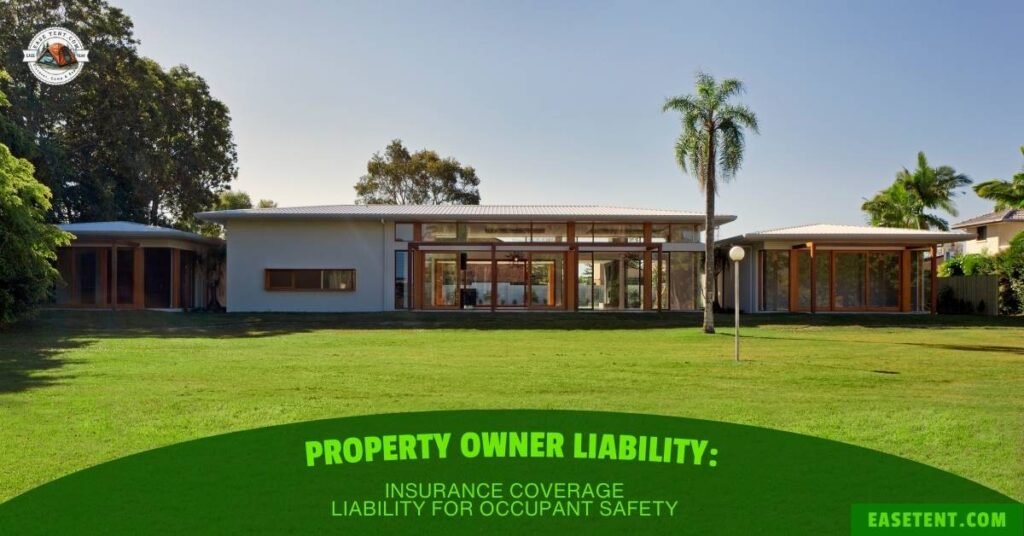
Understanding the property owner’s liability is critical when attending the campers. Important factors involve examining insurance coverage for guest stays and ensuring that the property fulfills safety standards. By taking steps to address these factors, you can provide a safe and enjoyable camping experience while diminishing the possibility of hazards and liabilities.
Insurance Coverage:
Hosting campers may impact your existing homeowner’s insurance policy. It’s recommended that you notify your insurance company about the deal in order to figure out if additional coverage is needed. Specialized liability insurance for short-term rentals or camper stays can protect against property damage, injuries, or legal claims arising from hosting guests.
Liability for Occupant Safety:
Property owners have an ethical responsibility to provide a safe environment for the campers. This involves addressing safety concerns such as fire hazards, the structural integrity of the building or land, and safety measures. Regular maintenance checks and quick fixes are crucial to minimizing risks and guaranteeing the well-being of campers during their stay.
Community Impact
Community impact considerations, like neighborhood concerns and compliance with Homeowners Association (HOA) rules and regulations, have significance when hosting campers on your property. Below is an in-depth explanation:
Neighborhood Concerns:
Hosting tourists on your land not only increases your responsibilities but also impacts the community around you, leading to concerns such as increased traffic, noise levels, or parking issues. Communicating with neighbors about your plan and addressing their concerns is important to keep positive relationships alive. Actively managing these concerns through straightforward communication and respectful behavior can help in reduce any potential disruptions caused by a trailer stays.
(HOA) Rules and Regulations:
If your property falls under the jurisdiction of a homeowners association (HOA), there may be specific rules and regulations governing property use and rental activities. Review HOA rules and policies to ensure that you follow restrictions on short-term rentals or camper accommodations. Obtaining required authorizations or permits from the HOA before attending campers can prevent legal issues and provide a harmonious community environment.
Alternative living arrangements
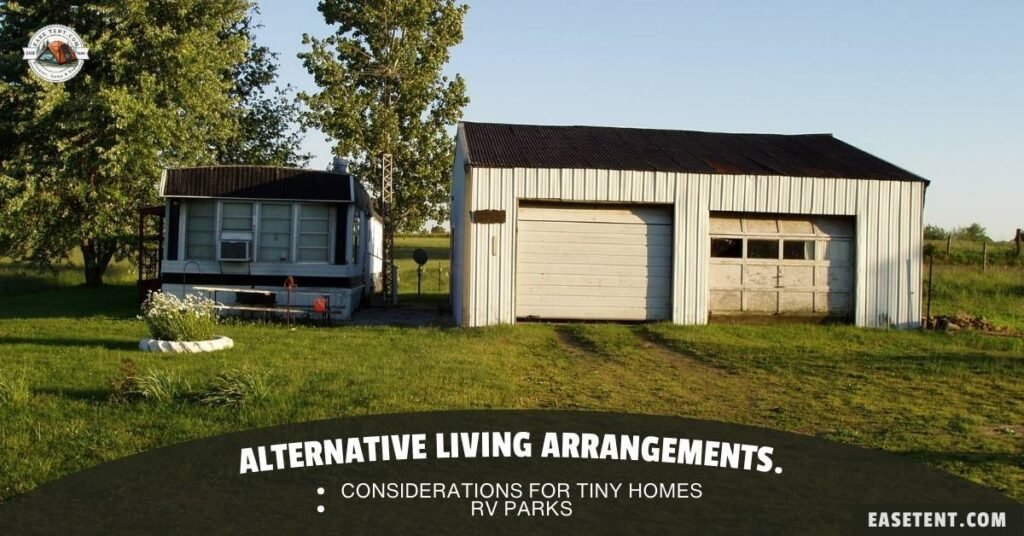
There are many campers who do not own a campervan and are willing to pay for a tiny home or a travel trailer. Therefore you must arrange alternatives to housing, such as small dwellings and RV parks, which provide unique options for accommodations and lifestyle. Here’s an in-depth clarification:
Considerations for Tiny Homes:
- Space Efficiency:
- Tiny homes are compact dwellings designed to maximize space utilization. Considerations include optimizing storage solutions and multifunctional furniture to maximize comfort and functionality within a limited footprint.
- Zoning and Regulations:
- Verify local zoning laws and building codes to ensure that tiny homes are legitimate on your property. Some areas may have restrictions on minimum dwelling sizes or zoning for permanent versus temporary residences.
- Community Integration:
- Investigate how tiny homes can integrate into the existing community, considering factors such as architectural design, landscaping, and compatibility with neighboring properties.
Considerations for RV Parks:
- Site Planning and Layout:
- Designate suitable areas inside your real estate for RV parking, ensuring adequate space, accessibility, and amenities like electrical hookups and waste disposal facilities.
- Legal Compliance:
- Study zoning requirements and permits required for operating an RV park on your assets. Make sure to comply with local legislation and safety requirements regarding RV accommodations.
- Facilities and Amenities:
- Offer essential facilities like restroom services, laundry services, and recreational areas to enhance the camping experience for RV guests.
- Guest Services and Management: Don’t forget to offers the additional services such as Wi-Fi access, trash collection, and security to attract and accommodate RV travelers effectively.
Legal documentation
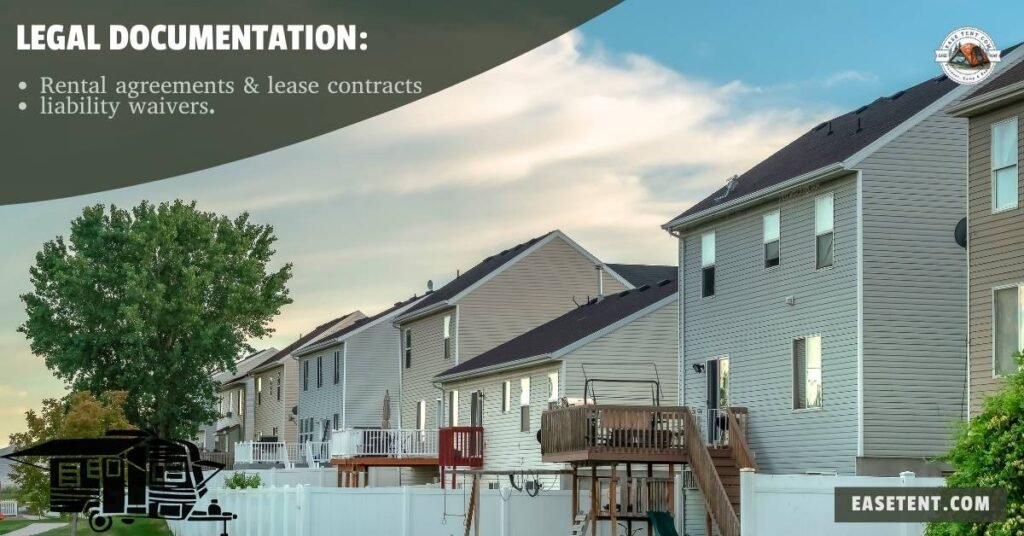
Legal documentation such as rental agreements, lease contracts, and liability waivers are important tools for clarifying responsibilities and protecting both property owners and campers. Here’s a detailed explanation in easy words:
Rental agreements and Lease Contracts
| Rental agreements | Lease Contracts |
|---|---|
| Rental agreements define the terms and conditions of the camper’s remain on your land and are mainly used for short-term contracts. This involves information like the duration of the stay, rental rates, payment schedules, rules for property use, and any specific obligations or restrictions. Rental agreements provide a clear understanding of the requirements for both sides and serve as a legal agreement to resolve conflicts or handle issues during the stay. | Lease contracts tend to be more detailed documents that are usually employed for longer-term remains. They contain detailed terms regarding occupancy, rent payments, maintenance responsibilities, property use restrictions, and termination clauses. Lease agreements provide legal protection for both individuals by establishing their rights and responsibilities throughout the duration of the lease. |
Liability Waivers:
Liability waivers are legal documents that release the property owner from specific obligations or claims arising from the camper’s stay. These waivers are often used to acknowledge and accept potential risks associated with activities or amenities provided on the site, such as recreational facilities or use of equipment. While liability waivers may offer a degree of security, they should be drafted carefully and may be subject to legal examination depending on local laws and regulations.
How long can someone live in a camper on my property?
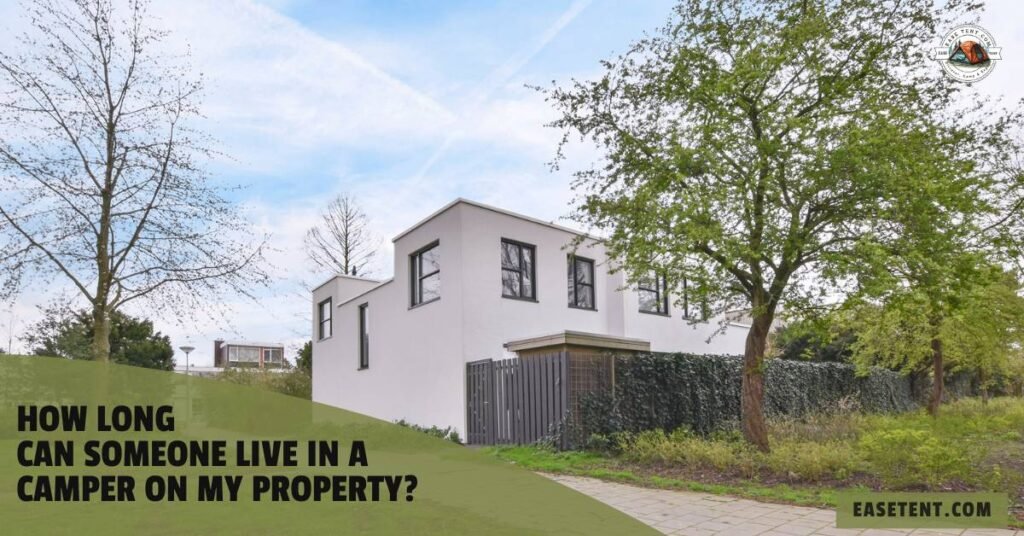
The duration that someone can live in a camper on your property can vary based on several factors, including the camper’s preference that how much time he want to spend also some of the local regulations, zoning laws, and the specific terms of your contract with the camper. Here’s a detailed explanation about it:
Local Regulations:
Validate local zoning laws and rules to understand the maximum permitted duration for temporary or permanent occupancy of a trailer on your estate. Certain regions have limitations on how long the individuals can live in recreational vehicles and temporary dwellings.
Permitting and Permissions:
Discuss with your local government or planning departments about the approvals or permissions required for extended camper stays. Because some states may have particular requirements or limitations regarding the residential use of campers on private property.
Agreed Terms:
It’s always an important thing to clarify the duration of stay with the camper through a rental agreement or lease contract. Clearly outline the start and conclusion dates of the camper’s residency, whether it’s for a short-term vacation or a longer-term arrangement.
Infrastructure and Utilities:
If a guest wants to stay for extended days, like for months or for years, then it’s obvious that they require more necessities for survival. Therefore, Review the capability of your property’s infrastructure (water, electricity, sewage) to cope with long-term camper use. Make sure that all necessary provisions meet the demands of extended stays.
How can I report if someone lives in a camper on my property?
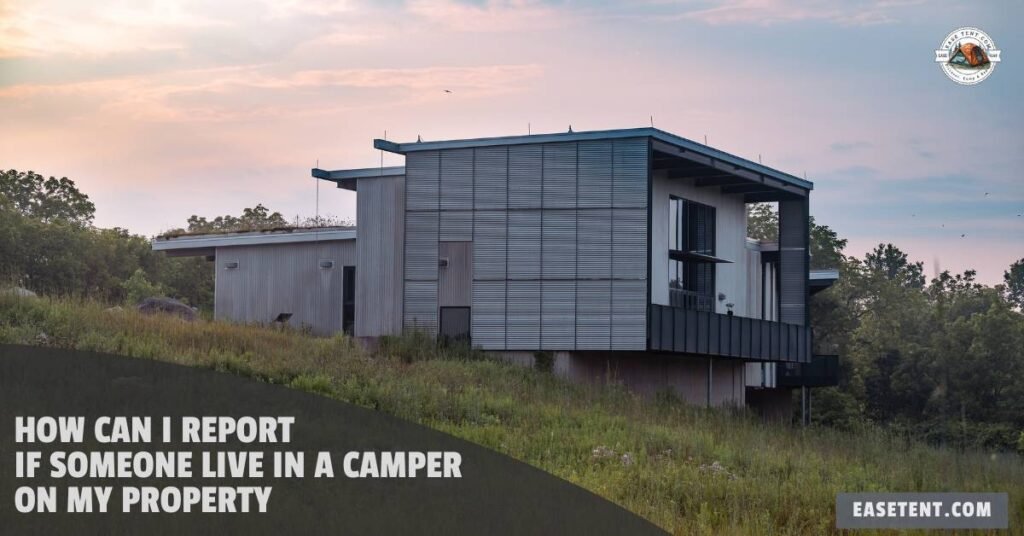
If someone is living in a camper on your property without your permission, then you can take the following steps to address the situation:
Contact Local Authorities:
Reach out to your local zoning or code enforcement office to report the illegal use of a camper on your property. Provide complete information regarding the current scenario, including the precise spot, duration of stay, and any other concerns you have.
Serve Notice:
If the individual refuses to leave your residence after being notified, you may need to give them an official notice to vacate. This can be done through a written notice delivered in person or through certified mail, that follows legal procedures based on your jurisdiction.
Consult Legal Specialist:
You also have to consult with local lawyers who have specialized knowledge of property law to understand your rights as a property owner and the legal options available to deal with illegal occupancy.
Document the Situation:
Maintain a written record of all communications, notices, and interactions regarding the illegal use. This documentation can be useful when a legal proceeding is required.
Consider Safety and Security:
Ensure your own protection and the security of your property during the entire procedure of addressing unapproved occupancy. Avoid any kind of clashes and prioritize the conversation via governmental channels.
Conclusion:
In conclusion, hosting campers on your property can be a rewarding experience, but it’s essential to consider various factors to ensure a successful and legally valid arrangement. Understanding the possible challenges and the community impacts is important for a positive and healthy relationship between you and your rental individuals. Additionally, familiarizing yourself with local regulations, such as zoning laws and permit requirements, helps navigate the legal aspects of camper accommodations. By addressing utilities, waste management, and community impact considerations, you can create a welcoming and sustainable environment for campers while respecting neighbourhood norms and regulations. Overall, proactive conversations, clear deals, and adherence to legal guidelines contribute to a successful and enjoyable experience for both property owners and campers alike.
You May Also Like:
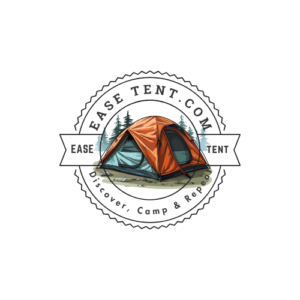
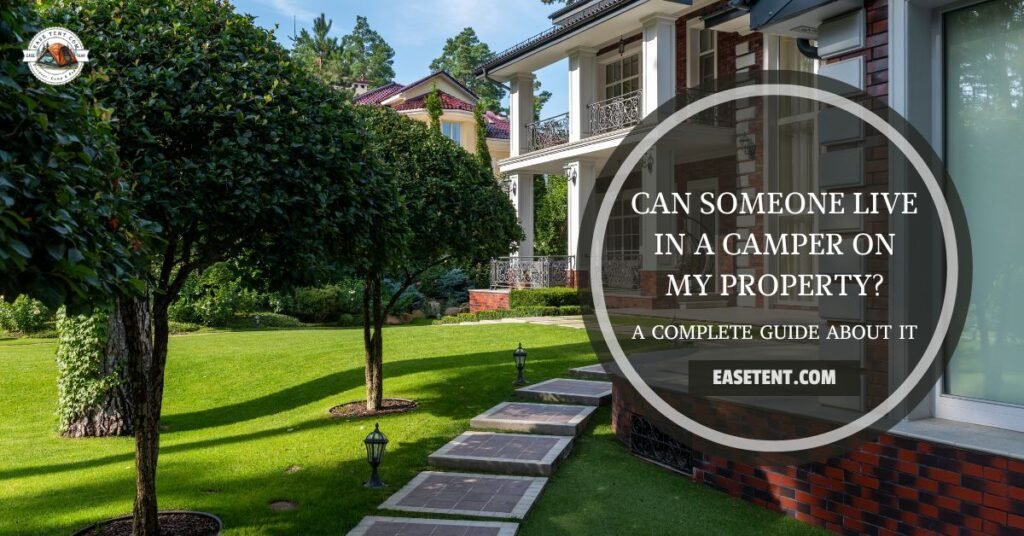
Pingback: Can you pitch a tent and sleep on the beach? Beach Camping